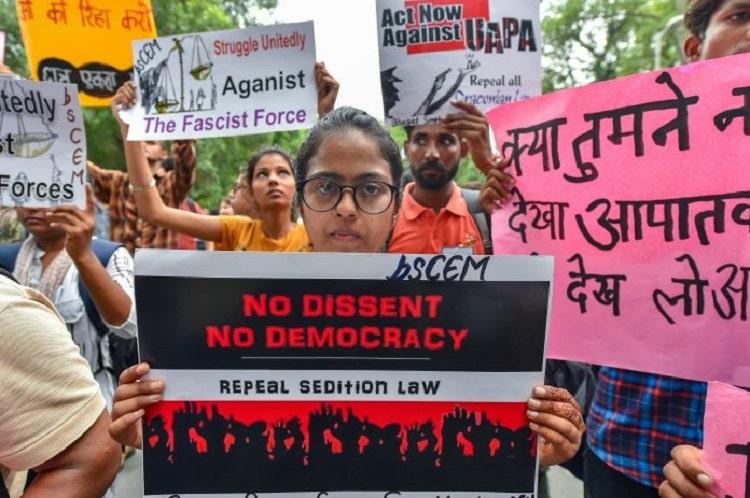
Photo for representational purposes only. PTI
Satya Prakash
New Delhi, May 10
As the Centre wanted to re-examine the law on sedition, the Supreme Court on Tuesday asked the Centre to spell out if all sedition cases filed across India could be kept in abeyance till the review of Section 124A of the IPC was completed.
A Bench led by CJI NV Ramana -- which agreed to the Centre's proposal to reconsider the colonial law on sedition -- asked the Centre to respond on Wednesday when the matter will be taken up again. The top court -- which was considering if petitions challenging the validity of sedition law should be referred to a seven-judge Bench -- wanted to know about the pending and future sedition cases.
Solicitor General Tushar Mehta told the Bench that the government was reconsidering the desirability of Section 124A. He however, refused to give a definite timeframe to complete the exercise.
On behalf of the petitioners, senior advocate Kapil Sibal said the court's exercise of examining the validity of a law can't be stopped merely because the legislature will take time to reconsider it.
Maintaining that Prime Minister Narendra Modi has been cognizant of various views expressed on sedition law, the Centre had on Monday told the Supreme Court that it has decided to “re-examine and re-consider” the provisions of Section 124A of the Indian Penal Code.
“The Government of India, being fully cognizant of various views being expressed on the subject of sedition and also having considered the concerns of civil liberties and human rights, while committed to maintain and protect the sovereignty and integrity of this great nation, has decided to re-examine and re-consider the provisions of Section 124A of the Indian Penal Code which can only be done before the competent forum,” the Centre said in an affidavit filed in the top court.
The affidavit urged the Supreme Court not to invest time in examining the validity of Section 124A – which was upheld by a five-judge Constitution Bench in Kedar Nath Singh’s case in 1962 -- once again and await the outcome of its reconsideration by the Government.
“The Hon’ble PM believes that at a time when our nation is marking ‘Azadi Ka Amrit Mahotsav’ (75 years since Independence), we need to, as a nation, work even harder to shed colonial baggage that has passed its utility, which includes outdated colonial laws and practices. In that spirit, the Government of India has scrapped over 1500 outdated laws since 2014-15. It has also ended over 25,000 compliance burdens which were causing unnecessary hurdles to people of our country. Various offences which were causing mindless hindrances to people have been decriminalised,” the affidavit read.
Terming it “an ongoing process”, the Centre said, “These were laws and compliances which reeked of a colonial mindset and thus have no place in today’s India.”
The affidavit said, “The Hon’ble Prime Minister of India has been cognizant of various views expressed on the subject and has also periodically, on various forums, expressed his clear and unequivocal views in favour of protection of civil liberties, respect for human rights and giving meaning to the constitutionally cherished freedoms by the people of the country. He has repeatedly said that one of India’s strengths is the diverse thought streams that beautifully flourish in our country.”
The Centre sought to highlight the fact that there were divergent views expressed in public by various jurists, academicians, intellectuals and citizens in general. “While they agree about the need for statutory provisions to deal with serious offences of serious nature affecting the very sovereignty and integrity of the country, acts leading to destabilising the government established by law by means not authorised by law or prohibited by law, requiring a penal provision for such purposes is generally accepted by everyone in legitimate State interest. However, concerns are raised about its application and abuse for the purpose not intended by law,” it noted.
Join Whatsapp Channel of The Tribune for latest updates.




























